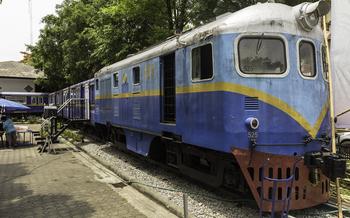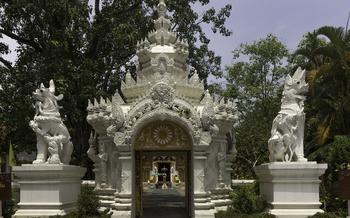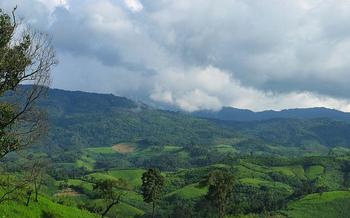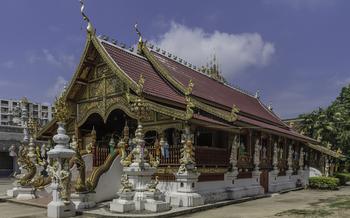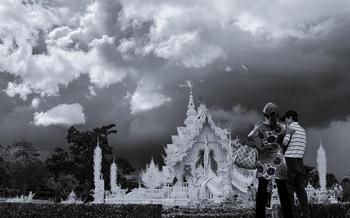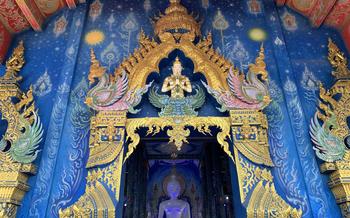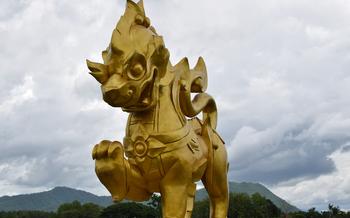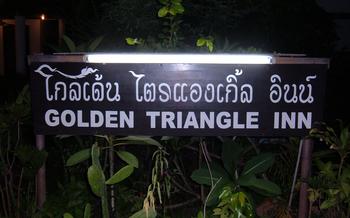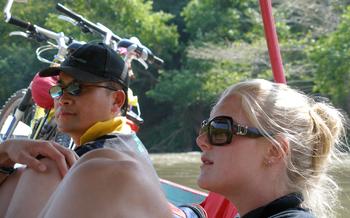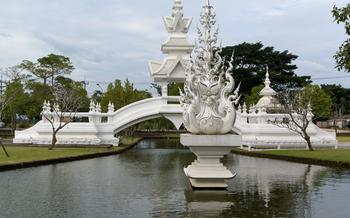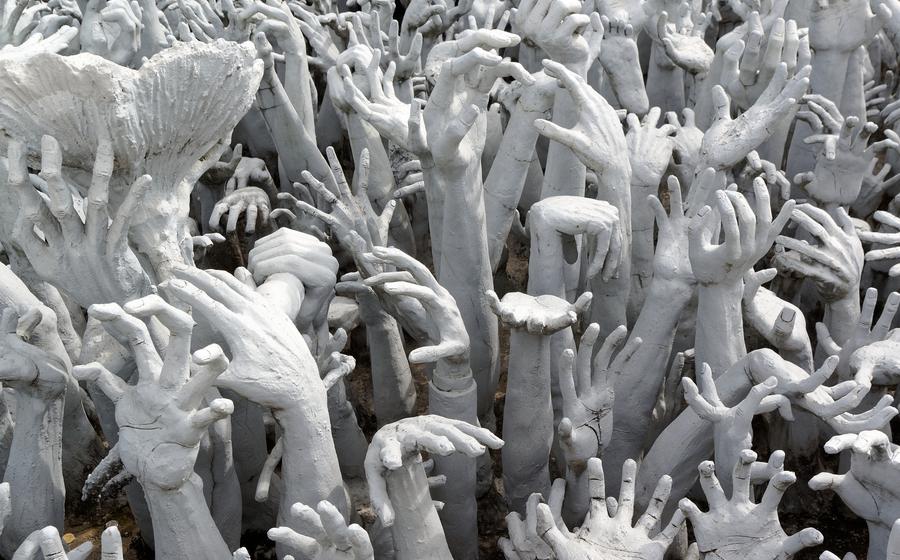
Doi Wao Market
- Doi Wao Market: A Unique Cultural Experience
- Getting to Doi Wao Market
- Best Time to Visit Doi Wao Market
- What to Expect at Doi Wao Market
- Must-Buy Items at Doi Wao Market
- Experiencing Akha Culture
- Food and Drinks at Doi Wao Market
- Taking Photos and Videos
- Solo Travel at Doi Wao Market
- Family-Friendly Activities
- Accessibility and Facilities
- Language and Communication
- Responsible Tourism
- Insider Tip: Discover the Secret Akha Village
Doi Wao Market: A Unique Cultural Experience
Nestled amidst the breathtaking landscapes of Chiang Rai, the Doi Wao Market offers a vibrant tapestry of culture, colors, and traditions. This unique market is home to the Akha hill tribe community, who have preserved their ancient customs and crafts with remarkable dedication. As you step into the bustling marketplace, you'll be captivated by the vibrant atmosphere and the colorful attire of the Akha vendors, who proudly showcase their handmade products. From intricate textiles and bamboo crafts to aromatic spices and fresh produce, the Doi Wao Market is a treasure trove of authentic Akha artistry and cultural heritage. Prepare to be amazed as you explore the diverse range of local products and handicrafts, each telling a unique story about the Akha people's rich cultural traditions.
Getting to Doi Wao Market
Doi Wao Market is conveniently accessible from Chiang Rai city, located approximately 75 kilometers away. The journey takes around 2-3 hours by car or taxi, offering a scenic drive through the picturesque countryside. Visitors can also opt for guided tours, which often include transportation and additional insights into the Akha culture and the market.
For those who prefer a more adventurous experience, renting a motorbike is a popular option. The roads leading to the market are generally well-maintained, and the ride offers a chance to explore the surrounding landscapes. However, it is essential to exercise caution and wear appropriate safety gear.
Self-exploration is another option for reaching Doi Wao Market. Visitors can take a local bus from Chiang Rai to Mae Sai, the border town near the market. From Mae Sai, shared taxis or songthaews (red pickup trucks) can be taken to the market, providing a budget-friendly and immersive experience.
Best Time to Visit Doi Wao Market
The best time to visit the Doi Wao Market is during the cooler months from October to February. During this time, the weather is pleasant, with moderate temperatures and low humidity, making it ideal for outdoor shopping and exploring. The market is open every day of the week, but it is particularly lively on weekends and public holidays.
If you are interested in experiencing the market at its peak, plan your visit during the Akha New Year celebration, which typically takes place in November. This is a time when the Akha people come together to celebrate their culture and traditions, and the market is filled with colorful decorations, traditional performances, and special offerings.
While the market is open year-round, it is important to note that during the rainy season (May to October), the weather can be unpredictable, with heavy downpours and occasional flooding. The market may also be less crowded during this time, as some vendors may choose to close their stalls due to the weather.
Overall, the best time to visit the Doi Wao Market depends on your personal preferences and interests. If you are looking for a comfortable and lively experience, the cooler months are ideal. If you are interested in experiencing Akha culture at its fullest, plan your visit during the Akha New Year celebration.
What to Expect at Doi Wao Market
As you enter the vibrant Doi Wao Market, your senses will be captivated by a kaleidoscope of colors, sounds, and aromas. The market is a labyrinth of stalls and vendors, each showcasing their unique wares. From intricately woven textiles to handcrafted jewelry, the variety of handmade crafts on display is simply astounding. The market also boasts a wide selection of fresh produce, spices, and local delicacies, ensuring that there's something for every taste.
One of the highlights of the market is the opportunity to interact with the friendly and welcoming Akha people. Known for their warm hospitality, the Akha are always happy to share stories about their culture and traditions. Visitors can learn about the Akha's way of life, their customs, and their beliefs. The market is a place where cultural exchange and understanding thrive, creating a truly immersive experience for visitors.
Amidst the hustle and bustle of the market, visitors can take a moment to appreciate the beauty of the Akha's traditional costumes. The women wear colorful skirts and blouses adorned with intricate embroidery, while the men sport distinctive headwear and traditional attire. These vibrant costumes are a testament to the Akha's rich cultural heritage and their deep connection to their roots.
Whether you're looking for unique souvenirs, delicious local food, or an authentic cultural experience, the Doi Wao Market has something to offer everyone. Embrace the vibrant atmosphere, engage with the friendly Akha people, and let the market's charm and beauty transport you to a world unlike any other.
Must-Buy Items at Doi Wao Market
Doi Wao Market is a treasure trove of unique and exquisite handmade crafts and souvenirs that reflect the rich cultural heritage of the Akha people. Among the must-buy items are their intricate silver jewelry, such as necklaces, earrings, and bracelets, which are adorned with intricate designs and often feature semi-precious stones. The Akha are also skilled weavers, and their colorful textiles, including scarves, bags, and clothing, are a popular choice for visitors.
For those interested in home décor, the market offers a variety of bamboo and rattan products, including baskets, mats, and furniture, which are both functional and aesthetically pleasing. Visitors can also find a variety of unique and authentic Akha souvenirs, such as traditional musical instruments, hand-carved wooden sculptures, and colorful ceramics.
When purchasing items at Doi Wao Market, it is important to remember the significance of these products to the Akha people. Each item is meticulously handcrafted, often using traditional techniques passed down through generations. By purchasing these items, visitors not only take home a piece of Akha culture but also support the local artisans and the preservation of their traditions.
Experiencing Akha Culture
The Doi Wao Market is not just a place to shop; it's also an opportunity to immerse yourself in the vibrant culture of the Akha people. As you wander through the stalls, take some time to observe the Akha people in their traditional costumes. The women often wear colorful skirts, blouses, and headwear adorned with intricate embroidery and silver jewelry, while the men wear loose-fitting pants and shirts.
Engage with the Akha people, ask questions about their way of life, and learn about their unique customs and traditions. They are friendly and welcoming people who are happy to share their culture with visitors. If you're lucky, you might even catch a glimpse of a traditional Akha dance or music performance.
Remember to be respectful of their culture and traditions. Avoid taking photos or videos without permission, and always ask before entering someone's home or taking part in a ceremony. By showing respect and appreciation for the Akha people, you'll create a positive and memorable experience for both yourself and the community.
Food and Drinks at Doi Wao Market
When it comes to culinary delights, the Doi Wao Market is a haven for food enthusiasts. Vendors offer a tantalizing array of local dishes and snacks that are sure to tantalize your taste buds. Indulge in the savory flavors of Akha cuisine, which is renowned for its use of fresh ingredients, aromatic herbs, and spices. Must-try dishes include "khanom jeen nam ngiao," a rice noodle soup with a spicy pork or beef broth, and "gaeng hang lay," a flavorful curry with pork, bamboo shoots, and wild herbs. Don't miss out on the delicious grilled meats, such as "sai ua," a northern Thai sausage made with pork, lemongrass, and kaffir lime leaves.
To satisfy your sweet cravings, sample the delectable "khanom khrok," a coconut pancake with a crispy exterior and a soft, chewy interior. For a refreshing treat, try the "nam mao," a sweet and sour herbal juice made from roselle flowers. By sampling the local cuisine, you not only satisfy your taste buds but also support the local economy and get a glimpse into the culinary traditions of the Akha people.
Taking Photos and Videos
The vibrant colors and unique customs of the Doi Wao Market present an irresistible opportunity for capturing beautiful photos and videos. However, it's important to approach this with respect and sensitivity. Remember that the Akha people are not merely subjects for your photography; they are individuals with their own privacy and customs.
Before taking someone's photo, always ask for their permission. A simple gesture or a smile can go a long way in showing respect. Be mindful of the cultural context and avoid taking photos that might be considered intrusive or disrespectful. For example, it's best to avoid photographing religious ceremonies or rituals without permission.
When taking photos or videos, focus on capturing the essence of the market and the Akha culture. Look for candid moments that showcase the daily life, interactions, and traditions of the people. By doing so, you not only create beautiful memories for yourself but also contribute to a broader understanding and appreciation of this unique community.
Remember, the goal is to capture the beauty and authenticity of the Doi Wao Market while respecting the privacy and customs of the Akha people. With a little thoughtfulness and consideration, you can create stunning images that both celebrate and honor this vibrant cultural experience.
Solo Travel at Doi Wao Market
Traveling solo to Doi Wao Market can be a rewarding and enriching experience. The market is generally safe and welcoming, and the Akha people are known for their hospitality. However, there are a few things to keep in mind to ensure a smooth and enjoyable visit.
First, plan your transportation in advance. Consider booking a guided tour that includes transportation from Chiang Rai, as it can be challenging to navigate public transportation on your own. If you prefer to explore independently, make sure to have a map or GPS device handy, and allow plenty of time for travel.
Once at the market, don't hesitate to ask for directions or assistance from vendors or other visitors. The locals are friendly and helpful and will be happy to guide you in the right direction.
If you're interested in learning more about Akha culture, consider hiring a local guide. They can provide insights into the history, traditions, and way of life of the Akha people, making your visit even more meaningful.
Finally, remember to be respectful and mindful of the local customs. Dress modestly, avoid taking photos of people without their permission, and be prepared to haggle politely. By following these tips, you'll have a safe and enjoyable solo trip to Doi Wao Market.
Family-Friendly Activities
The Doi Wao Market is an excellent destination for families with children. The vibrant atmosphere, colorful costumes, and friendly locals create a welcoming environment for kids of all ages. Children can enjoy watching traditional Akha performances, such as music and dance, which are often showcased at the market. There are also opportunities for kids to participate in hands-on activities, such as learning how to weave traditional Akha textiles or create their own crafts.
The market is also a great place for kids to learn about different cultures. They can interact with the Akha people, learn about their way of life, and see firsthand how traditional crafts are made. This can be a valuable educational experience for children, as it helps them appreciate the diversity of the world and the importance of cultural preservation.
To keep children engaged and entertained during your visit, consider involving them in activities such as treasure hunts or scavenger hunts. You can also bring along some snacks or toys to keep them occupied. Remember to supervise your children closely, as the market can be crowded and there may be uneven surfaces or stairs.
Accessibility and Facilities
The Doi Wao Market is generally accessible to visitors with disabilities or special needs. Wheelchair ramps and accessible pathways are available throughout the market, ensuring that everyone can navigate the grounds with ease. Restrooms are conveniently located and well-maintained, offering privacy and comfort to all visitors.
For added convenience, the market provides ample parking space for both cars and motorcycles. Dedicated parking areas are reserved for visitors with disabilities, ensuring their accessibility to the market. Seating areas are strategically placed throughout the market, allowing visitors to take breaks and rest their feet while enjoying the vibrant atmosphere.
An information center is located at the entrance of the market, providing visitors with maps, brochures, and other helpful resources. The friendly and knowledgeable staff is always ready to assist visitors with any questions or inquiries they may have.
While the market is generally wheelchair accessible, it's important to note that some areas may have uneven surfaces or narrow pathways. Visitors with mobility challenges should exercise caution and seek assistance if needed.
Language and Communication
The Doi Wao Market is primarily a local market, and many vendors may not speak English or other foreign languages. However, there are a few vendors who have some basic English proficiency, and they are usually happy to help tourists. If you are unable to communicate with a vendor, you can try using gestures, sign language, or translation apps. It is important to be patient and respectful when communicating, as many of the vendors have limited language skills.
A smile and a friendly attitude can go a long way in bridging the language barrier. Be prepared to use your hands and body language to communicate what you want. Pointing at items or using gestures can help the vendors understand what you are looking for. Additionally, you can use translation apps or phrasebooks to help you communicate with the vendors.
Remember, the Doi Wao Market is a place to experience the local culture and customs. Part of that experience is interacting with the people who live there, even if you don't speak the same language. Be open to learning new things and trying new ways of communicating. Your efforts will be rewarded with a unique and memorable experience.
Responsible Tourism
As a traveler, it's important to be mindful of your impact on the environment and the local community. Here are some tips for responsible tourism at the Doi Wao Market:
-
Reduce your carbon footprint: Consider walking, cycling, or taking public transportation to the market. If you must drive, carpool with others to reduce the number of vehicles on the road.
-
Respect the environment: Avoid littering and dispose of your waste properly. Use reusable water bottles and shopping bags to reduce plastic waste.
-
Support local businesses: Buy souvenirs and products directly from the Akha artisans. This helps to support their livelihoods and preserve their traditional crafts.
-
Be respectful of the Akha culture: Dress modestly and avoid taking photos or videos of people without their permission. Learn a few basic Akha phrases to show your respect for their language and culture.
Insider Tip: Discover the Secret Akha Village
Venture beyond the market and explore the nearby Akha village to immerse yourself fully in their culture. Ask a friendly vendor for directions or hire a local guide to lead you through the village. Experience the warmth and hospitality of the Akha people as they welcome you into their homes, share their stories, and demonstrate their traditional way of life. This unique opportunity offers a glimpse into the authentic Akha culture and creates lasting memories of your visit to the Doi Wao Market.
